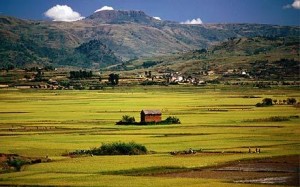Telegraph | 14 January 2009
One of the world's largest land deals, a scheme to lease African farmland to rich countries to grow their own crops, has collapsed amid accusations of 'neo-colonialism'.
Madagascar was poised to sign a 99-year agreement to rent 1.3 million hectares of land to South Korea's Daewoo Logistics Corporation to plant maize and palm oil for export.
Food-importing countries with little arable land, mainly in Asia and the Middle East, are increasingly looking overseas to secure food supplies after the prices of staple foods rocketed last year.
But the practice has drawn criticism that it harks back to colonial-era "plantation agriculture" where rich outsiders force subsistence farmers off fertile land to grow export crops.
Now the Daewoo plan, the largest in Africa covering an area of roughly half of Madagascar's current arable land, has been put on hold after the Malagasy people protested that it would make them a "South Korean colony".
"We are in big trouble with the government of Madagascar," said Shin Dong-hyun, the general manager of planning and finance at Daewoo Logistics Corporation.
"The process was ongoing, but it has suddenly been stopped because of media reports. Those reports have made Madagascan people very angry because it makes them ashamed for being a part of what they say is a neo-colonial system."
The company had planned to grow maize and palm oil on vast commercial farms for export either back to South Korea or to sell at international markets to raise funds to buy other food for its domestic market.
Kenya, Sudan, Ethiopia and now Madagascar have all recently offered vast tracts of farmland for lease, hoping to cash in on a growing trend whereby developing countries from Ukraine to Cambodia offer fertile land to the highest bidder.
Qatar plans to lease 40,000 hectares along Kenya's coast to grow fruit and vegetables for its own citizens, in return for building a £2.4 billion port close to the Indian Ocean tourist island of Lamu.
Abu Dhabi announced discussions with Sudan to rent 30,000 hectares of land watered by the Nile to grow its own maize and alfalfa. Senegal is also said to be hunting for a similar deal.
The idea, which has been called a "new scramble for Africa", is not without its critics, who question why Africa should lose valuable farmland when it is chronically short of its own food.
Jacques Diouf, the head of the United Nations Food and Agriculture Organisation, has called the land deals a type of "neo-colonialism".
"It's clearly a good sign that these developing country governments are looking to more long-term ways to benefit from their agricultural land, but at the moment these deals all look far more lucrative for the buyer than for the seller," said Duncan Green, the head of research at Oxfam.
Kenya's deal with Qatar also looks set to come up against stern resistance from local growers.
"We cannot be happy in a country which has so many hungry people to see our farmland being used to grow crops for foreigners," said Zachary Makanya, the director of Pelum Kenya, an organisation representing small scale farmers.
"Instead of selling our land to Qatar or whoever, the Kenyan government should invest in helping our farmers to grow more and sell more to our own people."
According to Chido Makunike, an African agribusiness analyst and food exporter based in Dakar, Senegal, such "plantation" agriculture models are old fashioned and ineffective, despite promises of jobs and modern farming techniques.
"The realistic future of commercial farming in Africa is likely to be a hybrid combining commercial farms with local growers," said Mr Makunike.
"Commercial farmers can set up a smaller nucleus farm for high yield, high input agriculture, but then support surrounding small-scale farmers to be out-growers who they contract to grow for them.
"Instead of these people being farm-labourers they remain farmers or small business people in their own right who retain the dignity of being their own bosses."














